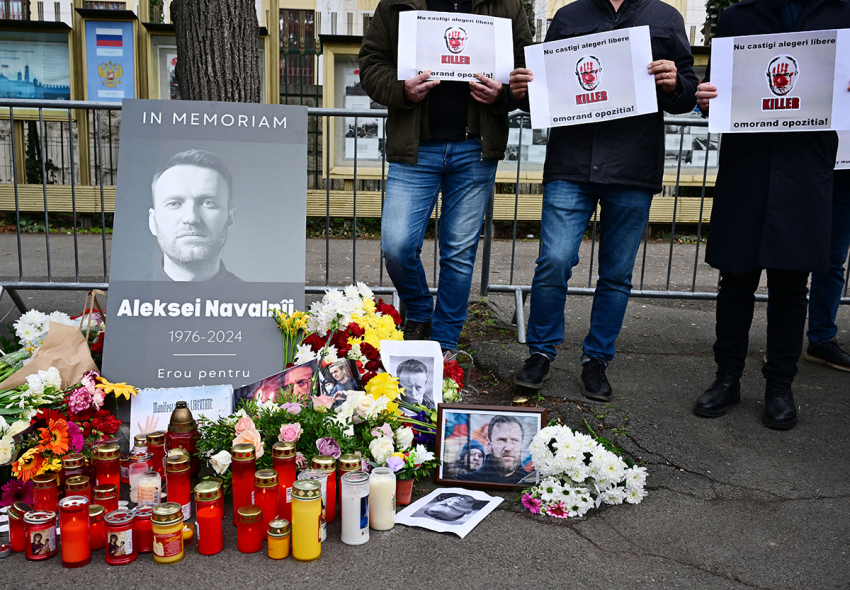Russian priest suffers stroke after being detained for holding Alexei Navalny memorial service

A priest in St. Petersburg has suffered a stroke after being arrested and detained for planning a memorial service for the late Kremlin critic Alexei Navalny in Russia. The priest, who is now hospitalized, was apprehended near his residence as he headed to a memorial site for Soviet political repression victims.
Grigory Mikhnov-Vaitenko, the detained priest, identified by his wife on Facebook, was on his way to the Solovetsky Stone in St. Petersburg when he was apprehended and taken into custody on Saturday, The Moscow Times reported.
BREAKING:
— Visegrád 24 (@visegrad24) February 17, 2024
The Russian police has arrested the priest Grigory Mikhnov-Vaitenko after he announced he would hold a public memorial service for Alexei Navalny in St Petersburg today pic.twitter.com/wIUcqYwsvt
His health deteriorated while at police station No. 43, leading to his hospitalization in the intensive care unit with stroke symptoms, according to Boris Vishnevsky and Lev Shlosberg, opposition deputies from St. Petersburg and Pskov, respectively.
The detention took place shortly after Russian authorities announced Navalny’s death, prompting widespread memorials across Russia, where supporters laid flowers and photos at monuments.
Despite the planned service for Navalny, the Russian Orthodox Church distanced itself from Mikhnov-Vaitenko, stating he is not a priest of their church and advised the public to disregard his statements.
This incident coincides with the detention of over 170 individuals at Navalny memorials nationwide, a response to Russian police warnings against such gatherings, The Moscow Times said.
Navalny, who was serving a 19-year sentence, had been a vocal critic of the Kremlin, leading to his imprisonment and the subsequent crackdown on his supporters and organizations, labeled “extremist” by Russian authorities.
On Sunday, reports emerged of Navalny’s body being found at a morgue in the Arctic after his mother was unable to find his body at the Salekhard District Clinical Hospital on Saturday, where it was reported that his body was initially taken, The Telegraph reported.
His body showed signs of bruising on his head and chest when it was brought into the Salekhard hospital, according to an unnamed paramedic who was interviewed by the exiled Novaya Gazeta newspaper. He added that such injuries could be from a seizure.
“The person convulses, they try to restrain him, and bruises appear. They also said that he also had a bruise on his chest. That is, they still tried to resuscitate him, and he died, most likely, from cardiac arrest,” the paramedic said, according to Novaya Gazeta.
Russian prison officials claimed that Navalny died on Friday after a walk at the IK-3 prison camp in the Russian Arctic. However, Navalny's colleagues at the Anti-Corruption Foundation have accused the Russian authorities of a cover-up.
Navalny’s death has elicited reactions from various quarters, highlighting his significant role in opposing the Putin regime.
In an opinion piece for The Spectator, Owen Matthews reminisced about Navalny’s impact, describing him as a figure of bravery and defiance against corruption and authoritarianism in Russia.
Navalny’s efforts in promoting transparency and challenging the ruling party were reflected by his survival of a poisoning attempt in 2020, attributed to the Federal Security Service, Matthews noted, adding that despite the risks, Navalny returned to Russia in 2021, a move that led to his imprisonment and has been widely debated among his supporters and critics alike.
“The news (as yet not independently confirmed) that he died in prison came today as a physical blow — sickening, but at the same time tragically unsurprising,” Matthews wrote. “Navalny’s passion, his intelligence and his refusal to make compromises with the Putin regime made him a colossus in a world of opposition politicians filled with moral pygmies. The Soviet Communist party once claimed to be the ‘intelligence, the honor and the conscience’ of the Russian people. But that title properly belongs to Navalny, whose life and career were living proof that Putin had not yet entirely extinguished Russians’ spirit of freedom and defiance, even in the face of terrifying odds.”



























